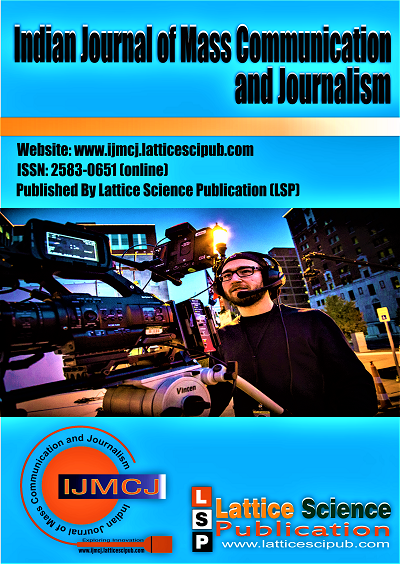Revisiting a Controversial Cartoon: Aseem Trivedi’s ‘Wolf Capital’
Main Article Content
Abstract
This article is a close reading of a controversial political cartoon drawn by cartoonist Aseem Trivedi. It examines how the cartoon texts construct a discourse of resistance and also connect to other optical metaphors within the repertoire of Indian political and cultural sign systems. This critical reading reveals that cartoons are not only a communicative event but also a vehicle of collective memory.
Downloads
Article Details

This work is licensed under a Creative Commons Attribution-NonCommercial-NoDerivatives 4.0 International License.
How to Cite
References
Scully, R., & Quartly, M. (2020). Drawing the line: Using cartoons as historical evidence. Monash University ePress Monograph.
DOI: https://doi.org/10.26180/5f3c66aaa8206
Wahl-Jorgensen, K., & Boelle, J. (2024). Vernacular journalism: Local news and everyday life. Journalism, 25(8), 1603-1619.
DOI: https://doi.org/10.1177/14648849231209707
Chacko, P. (2018). The Right Turn in India: Authoritarianism, Populism, and Neoliberalization. Journal of Contemporary Asia, 48(4), 541-565. DOI: https://doi.org/10.1080/00472336.2018.1446546
De, M. B., & Kim, C. (2016). Social Movements against Corruption and Sexual Violence in India: Urban Middle Class Approaches. Asian Journal of Social Science, 44(1-2), 7-33. DOI: https://doi.org/10.1163/15685314-04401002
Desai, R. W., Devadawson, C. R., & Verma, R. (Eds.). (2025). English and Indian Literature: Precolonial to Postcolonial. Taylor & Francis.
DOI: https://doi.org/10.4324/9781003615521
Parker, S. K. (2018). Lived cosmologies and objectified commodities: reinventing the traditional art of India in a world of cultural tourism. The Copenhagen Journal of Asian Studies, 29(1), 120-158. DOI: https://doi.org/10.22439/cjas.v29i1.4023
Vårenius, F. (2022). Ideology, Allegory, and Identity: A Study of American Political Cartoons, 1770-1815. Ebook. http://uu.diva-portal.org/smash/get/diva2:1668296/FULLTEXT01.pdf
Pinney, C., & Thomas, N. (Eds.). (2020). Beyond aesthetics: art and the technologies of enchantment. Routledge. Beyond Aesthetics: Art and the Technologies of Enchantment - 1st Editi
Desai, R. W., Devadawson, C. R., & Verma, R. (Eds.). (2025). English and Indian Literature: Precolonial to Postcolonial. Taylor & Francis.
DOI: https://doi.org/10.4324/9781003615521
Anderson, B. (2020). Imagined communities: Reflections on the origin and spread of nationalism. In The New Social Theory Reader (pp. 282-288). Routledge. Imagined Communities | 46 | v2 | Reflections on the origin and spread
Ashcroft, B., Griffiths, G., & Tiffin, H. (2024). The postcolonial studies reader. Routledge. DOI: https://doi.org/10.4324/9780429469039
Fajardo, C. (2022). Jacques Rancière: aesthetics, time, politics. Journal of Aesthetics & Culture, 14(1), 2049497.
DOI: https://doi.org/10.1080/20004214.2022.2049497
Halbwachs, M. (2020). On collective memory. University of Chicago Press. Ebook. Maurice Halbwachs, On Collective Memory - PhilPapers
Longhurst, B., Smith, G., Bagnall, G., Crawford, G., & Ogborn, M. (2016). Introducing cultural studies. Routledge. Ebook. Introducing Cultural Studies - 3rd Edition - Brian Longhurst - Greg Sm
Hall, S. (2020). Culture, community, nation. Cultural studies, 7(3), 349-363. file:///C:/Users/shivk/AppData/Local/Temp/MicrosoftEdgeDownloads/72c33ef5-43e6-41f1-bb72-fadb8bc34a09/Hall_Culture,%20Community,%20Nation.pdf
Ahuja, N. B. (2021, July 29). How the seditionist label cost Aseem Trivedi. The Week. https://www.theweek.in/theweek/cover/2021/07/29/how-the-seditionist-label-cost-aseem-trivedi.html





